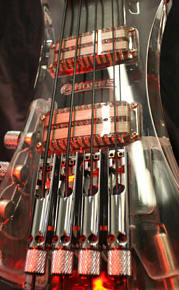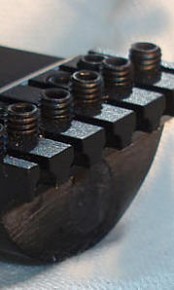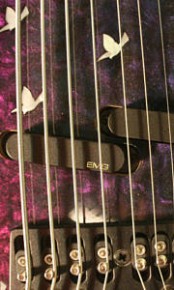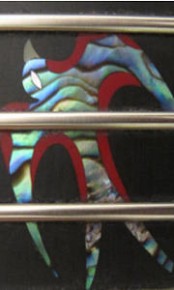Arcotech CarboCore Cello Fingerboards: Romberg & ‘C’

SOUND COMPOSITES ARCOTECH FINGERBOARDS… THE EBONY ALTERNATIVE
![]()
Sound Composites Arcotech carbon graphite fingerboards are competitively priced direct replacements for standard Ebony wood boards. These durable classic-styled Romberg and modern ‘C’ shape stringed instrument fingerboard models produce even and warm tonal characteristics while dramatically reducing the need for repair and replacement.
Sold at the price of Grade A Ebony
“As you well know, to get good Ebony is becoming harder and harder. To tell the truth, we have to find the replacement for Ebony in near future.” Shiny Tamura, YAMAHA CORPORATION 2008/05/20
Sound Composites Arcotech stringed instrument fingerboards are designed to have the overall textbook density of Ebony. Thus, they are entirely compatible with wood-necks instruments.
Sound Composites has developed a material designed for optimal technical and sonic outcomes. Arcotech Fingerboards are extremely stable. These fingerboards have a non-wearing and moisture-proof surface that does not swell, wear or groove. Indeed, they are impervious to string wear while remaining easy to tool. These fingerboards are satin smooth to the touch, tonally consistent and even throughout the entire fingerboard. They provide a traditional aesthetic. Specifically, structural carbon fiber is not present close to the fingerboard surface. Thus, the 0.070″/2mm(-) friendly-to-work surface-adjoining material thickness may be tooled without wearing cutters, should the installer wish to dress the fingerboard surface and/or side walls. In essence, Sound Composites Arcotech fingerboards are not reliant on density nor hardness to deliver their ‘non-wearing’ surface, even when using abrasive strings. Therefore Sound Composites had been free to design a material for optimum sonic outcome, rather than primarily ‘attempting’ to address durability, as is the case with other fingerboard manufacturers. Please read more detailed technical and use information at the bottom of this page.
ARC-22: 4-string Cello Fingerboard. Two sidewall height models of each ‘curvature’ style
1.315” {33.5 mm} & 2.78” {70.5 mm} width
22.75” {579 mm}. length
Model ARC-22/6.5: 0.250” {6.5 mm} side walls. Model ARC-22/8.0: 0.312″ {8.0 mm} side walls.
Please specify Romberg or ‘C’ when ordering
List Price: $142
Our Retail Price: $120 direct
Dealer and OEM/volume purchase inquires encouraged.
Sound Composites Stringed Instrument Fingerboards allow for use of traditional application techniques with great results.
1: Due to the accurate and nuanced luthier-correct geometry of all model’s fingerboard surfaces, playing surface tooling is generally not required. Still, each standard-sized fingerboard is provided with a 0.078″/2mm thickness of a friendly-to-tool and tonally superior material. This thickness is placed on the top, sides and ends of the boards. This facilitates ease in tooling to fit the board to the instrument neck during installation. Specifically, Sound Composites has positioned the structural carbon fiber within the board so that luthiers will not contact this stiff, tool-abrasive material nor other core materials.
2: As stated above, initial board surfacing and need for resurfacing is either not required or at most, minimal. Boards are supplied with the proper minimum standard of relief. The low-friction graphite-based tooling medium is uniformly consistent, resulting in easy dressing of the surface. Since there is no grain, there isn’t any blow or chipping when properly working the material. Standard scrapers, files and sandpapers are all appropriate.
3: The fingerboards offer outstanding durability. Sound Composites boards in constant use have not needed refinishing since installations as long ago as 1981. Therefore intermittent redressing and periodic fingerboard replacement are no longer required.
4: The fingerboard surface is stable. There is no swelling nor movement on the board surface due to changes in humidity and/or temperature. This is another reason that the boards never require redressing. This is in contrast to the routine return of instruments with Ebony boards for periodic removal of raising grain, buzz-producing inconsistencies.
5: The boards may optionally be supplied with a 0.025” maple veneer on the back ‘glue’ surface to facilitate the use of traditional hide glue. For boards that are requested to be provided without wood backing, aliphatic resin (Tight Bond/yellow glue) is an excellent choice. The wood veneer is inset 0.078″/2mm inside the fingerboard edge to insure that it will not become exposed during side wall dress-in.
6: Sound Composites fingerboards have a smooth, low friction surface for ease in playing. Player often comment that instruments with these boards are very comfortable in the hand.
7: Sound Composites fingerboards contribute to high quality tone production. This is due both to the structural ‘design’ and material embodiment of the fingerboards. The ability of Sound Composites ‘tonally filtered’ carbon fiber to provide excellent vibration damping and the overall consistency of manufacture are two key aspects.
8: All Sound Composites stringed instrument components have a visually pleasing ‘natural’ aesthetic due to the soft, lustrous quality of the surface material. To maintain this luster 0000 steel wool or 600/800 sandpaper used. With this finish, both players and luthiers often believes that Sound Composites fingerboards are made of Ebony until the distinction is pointed out.






